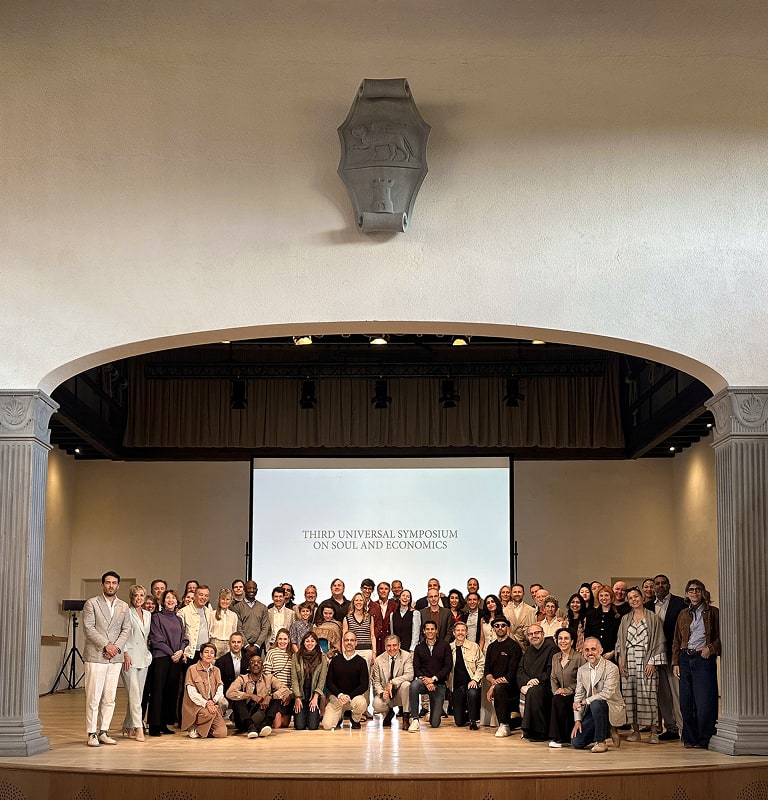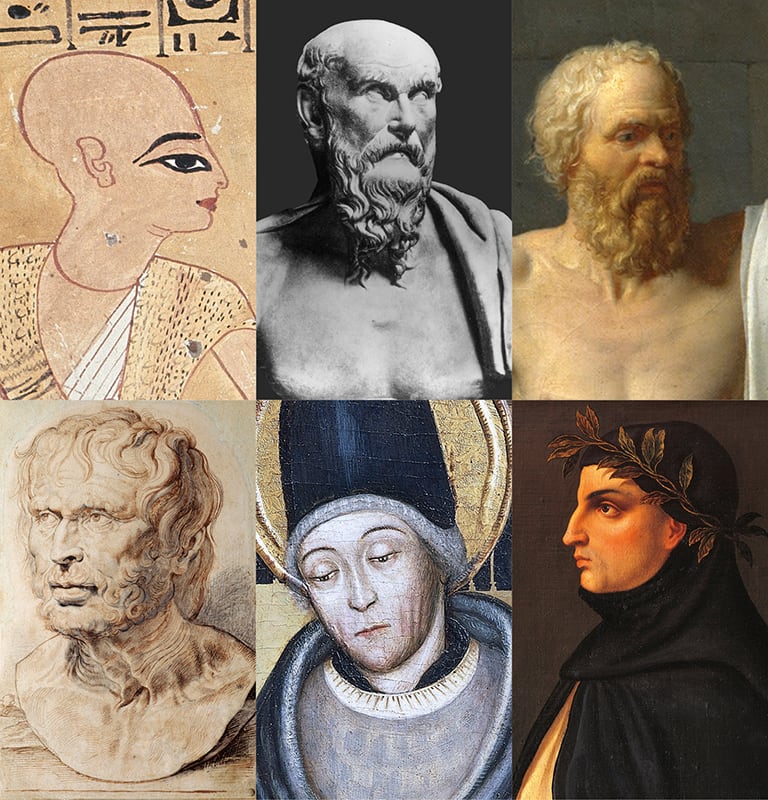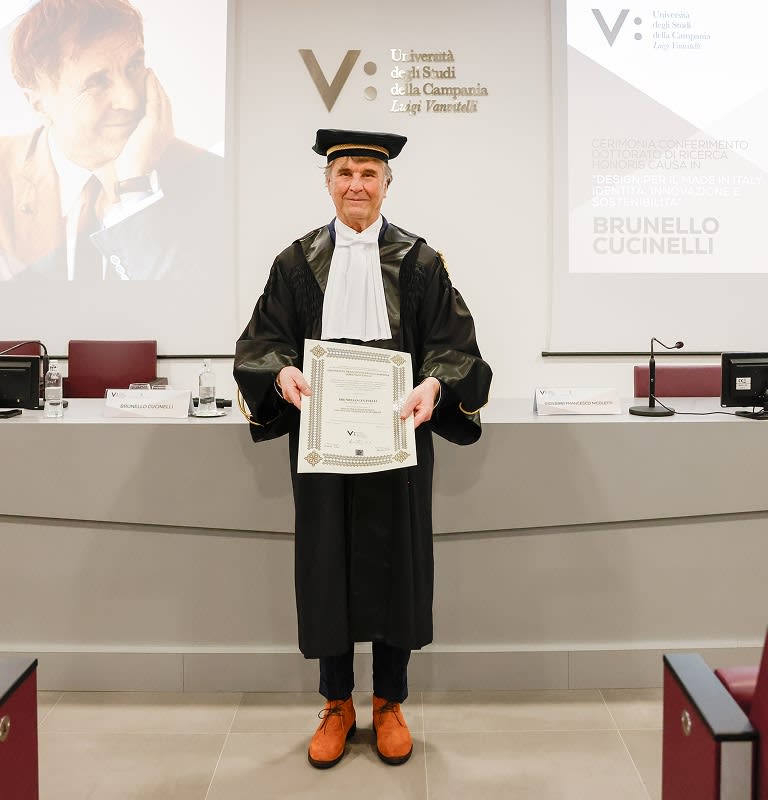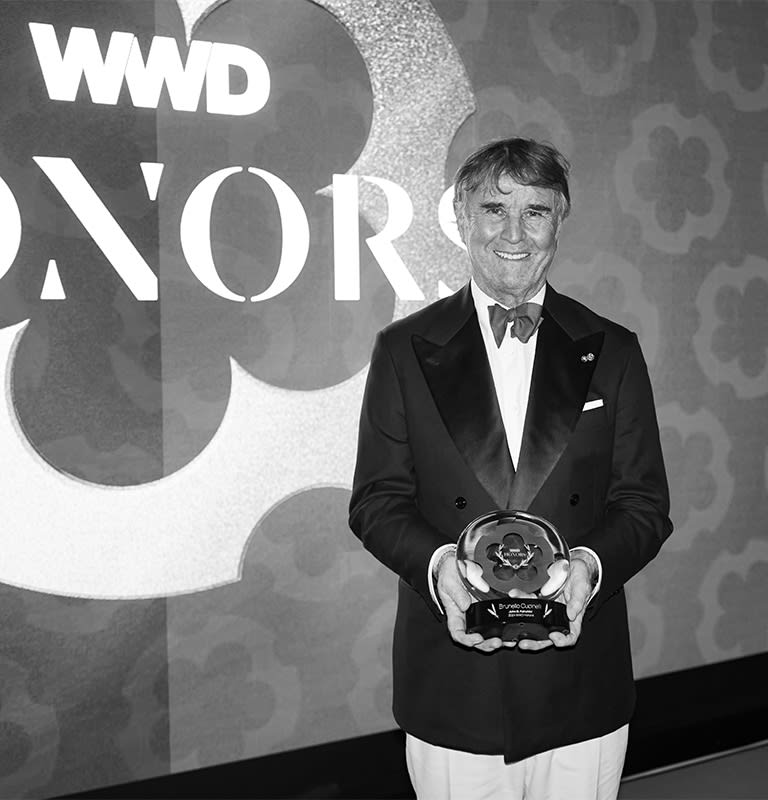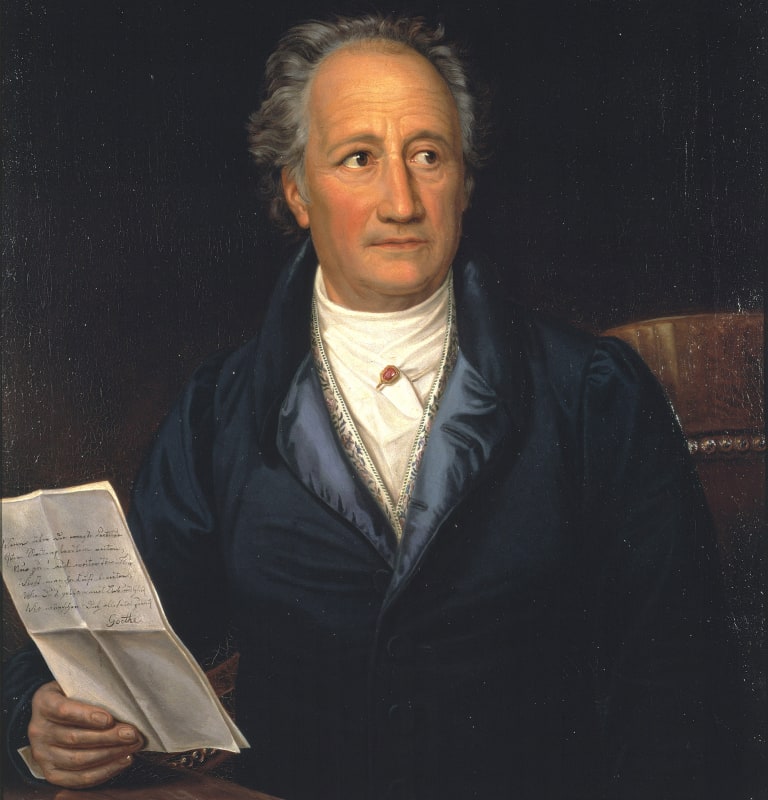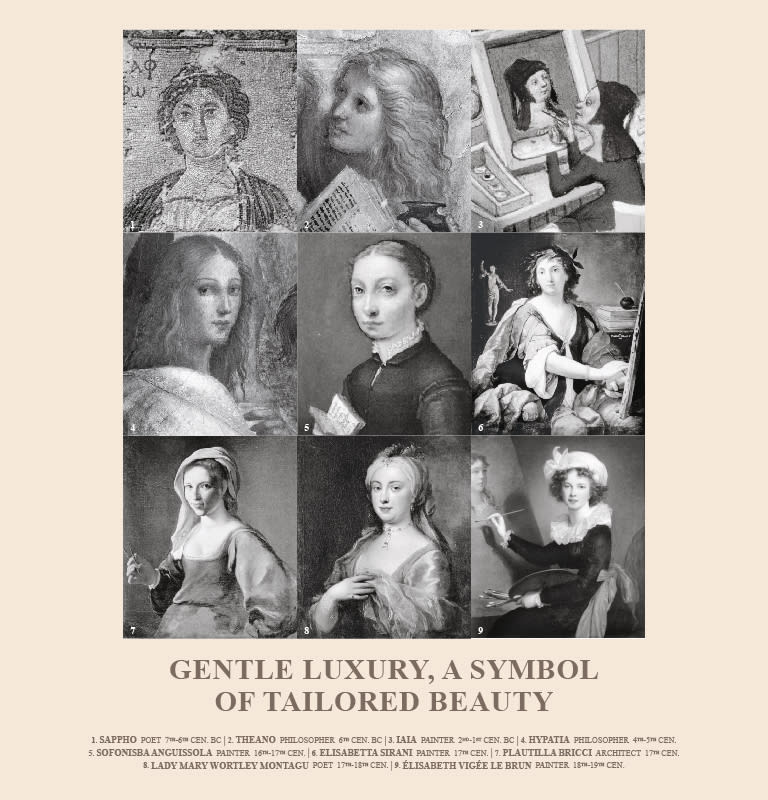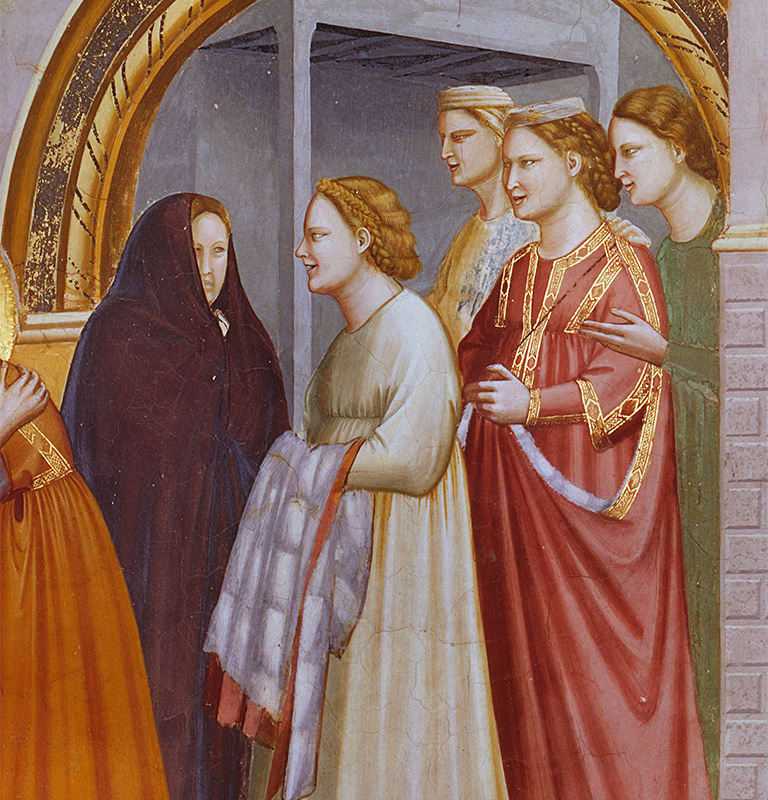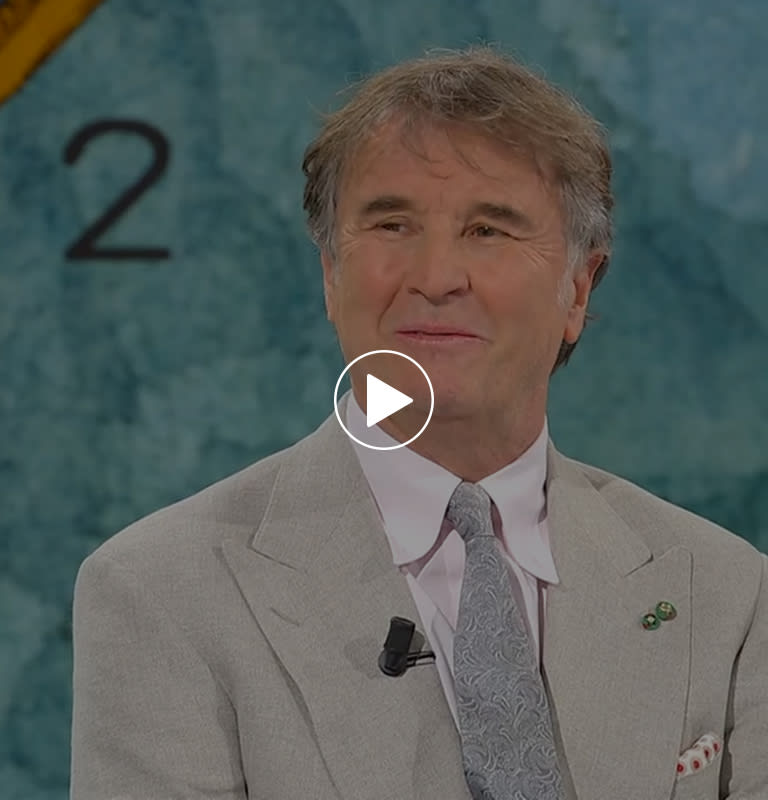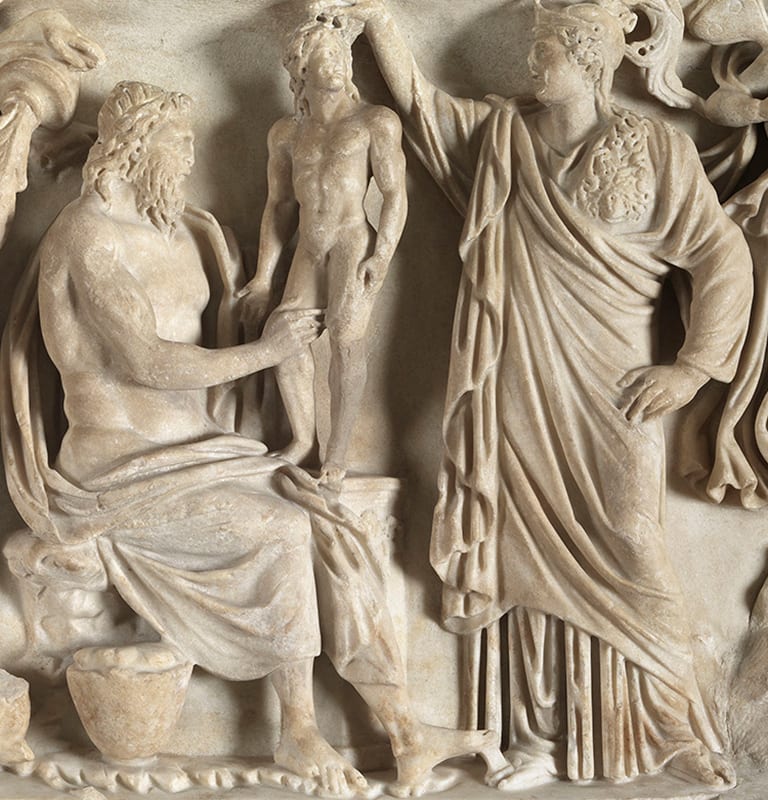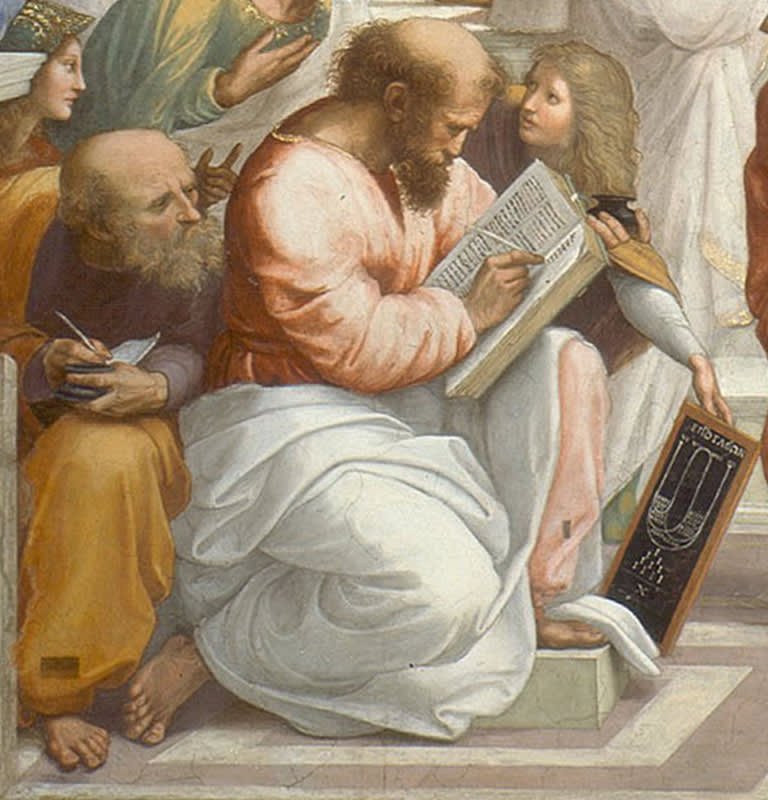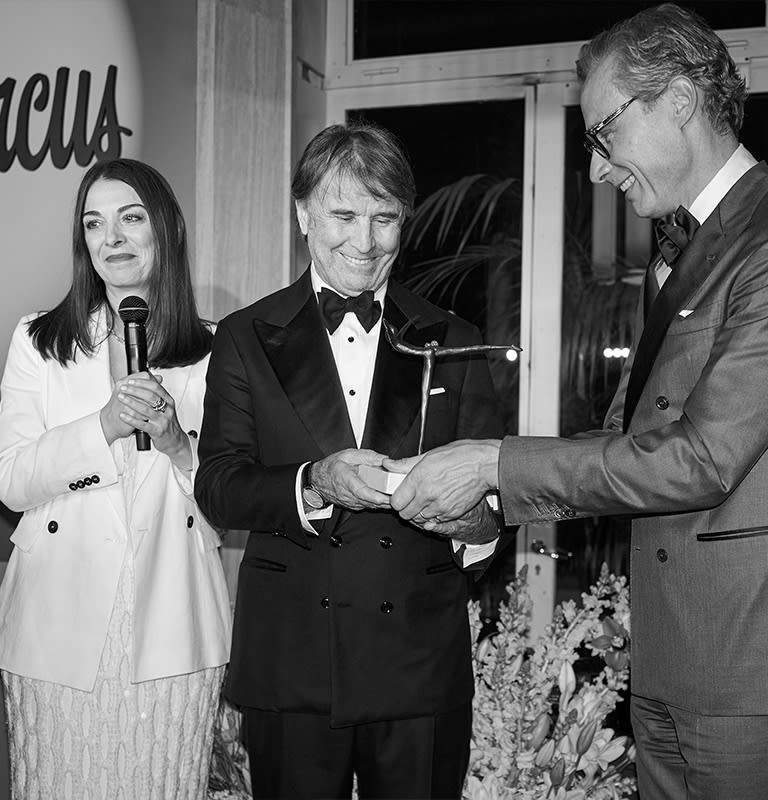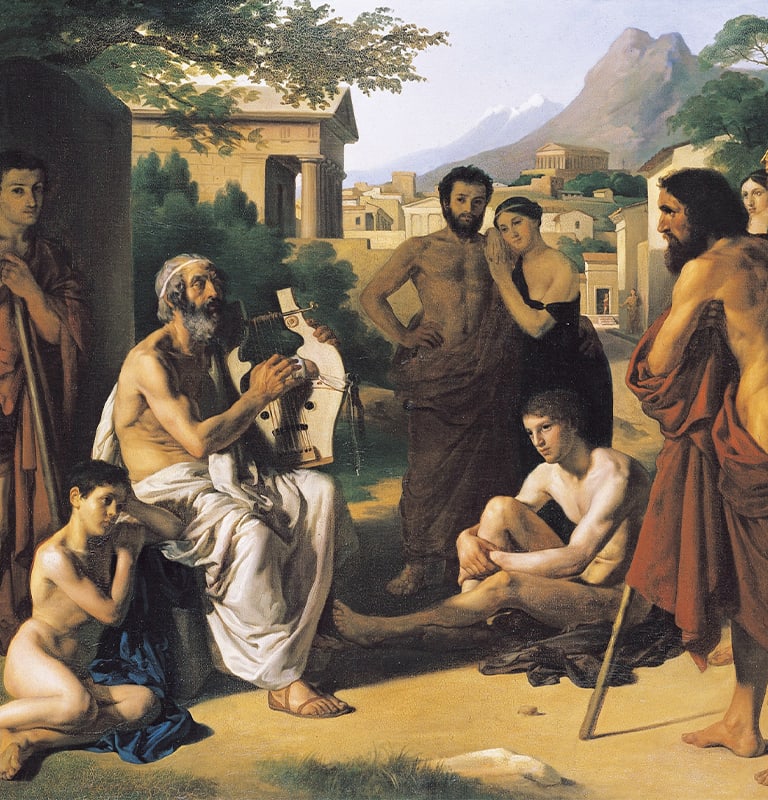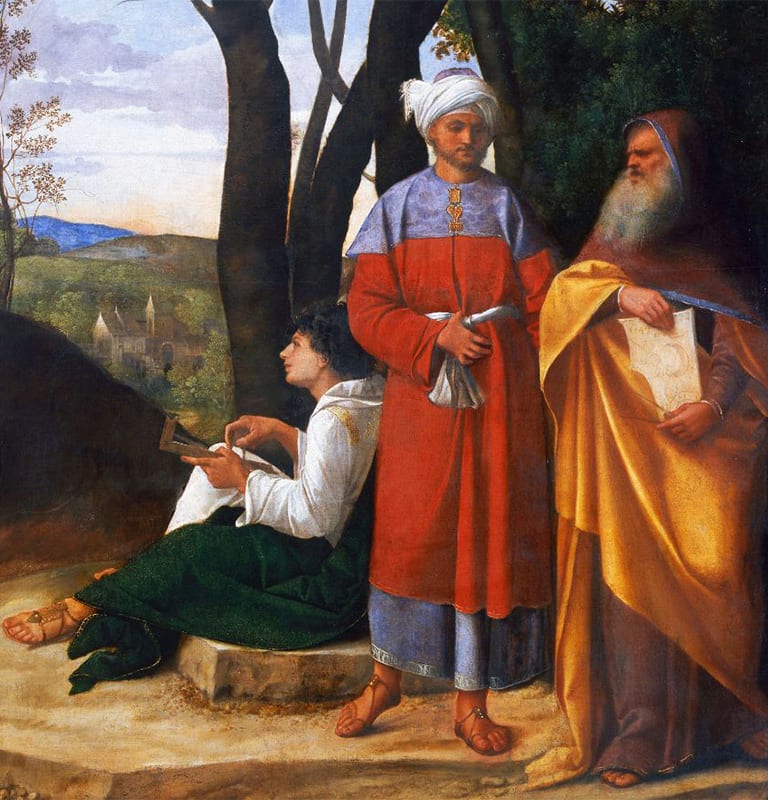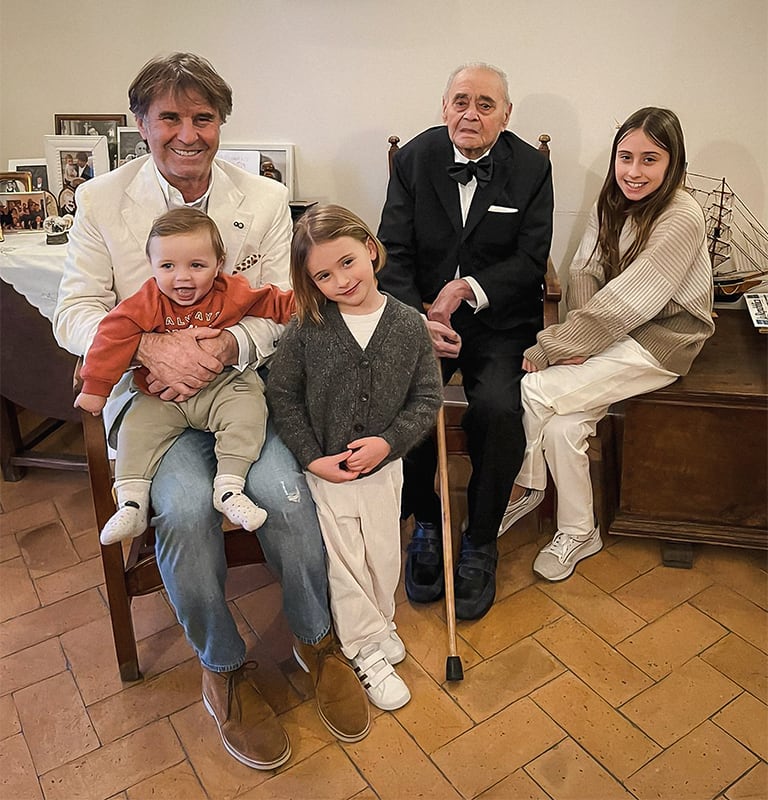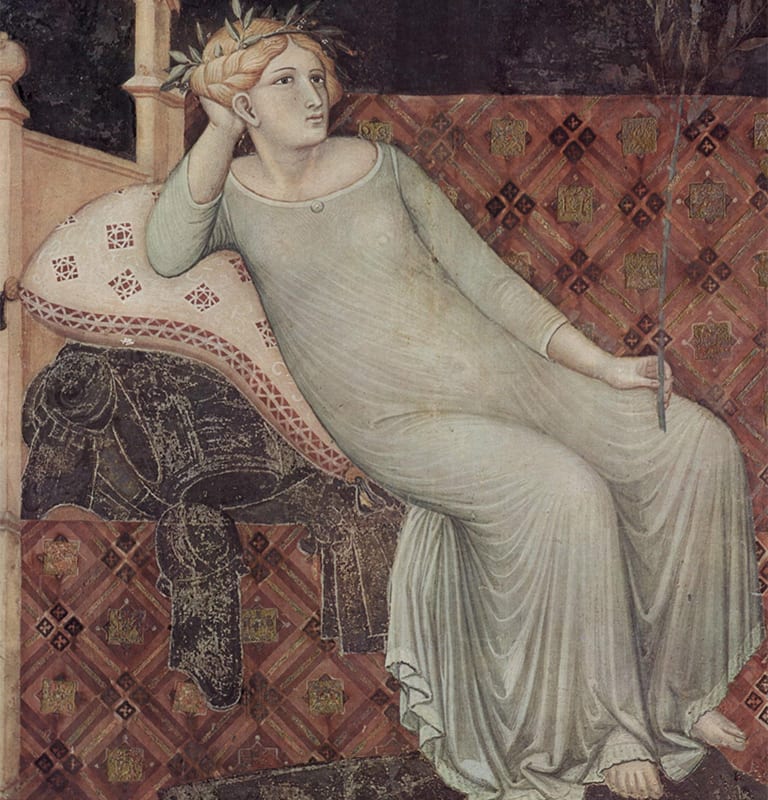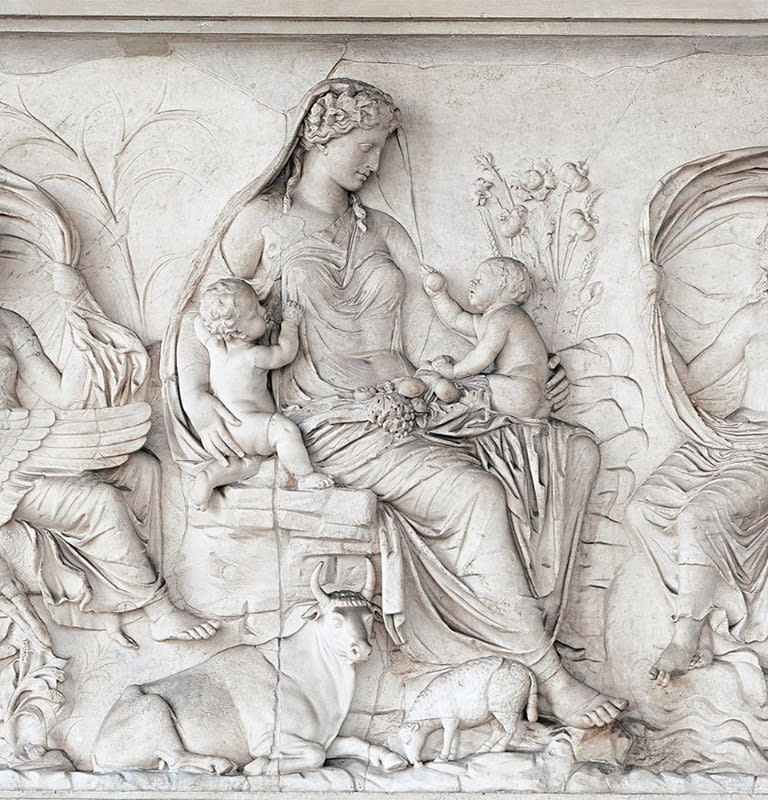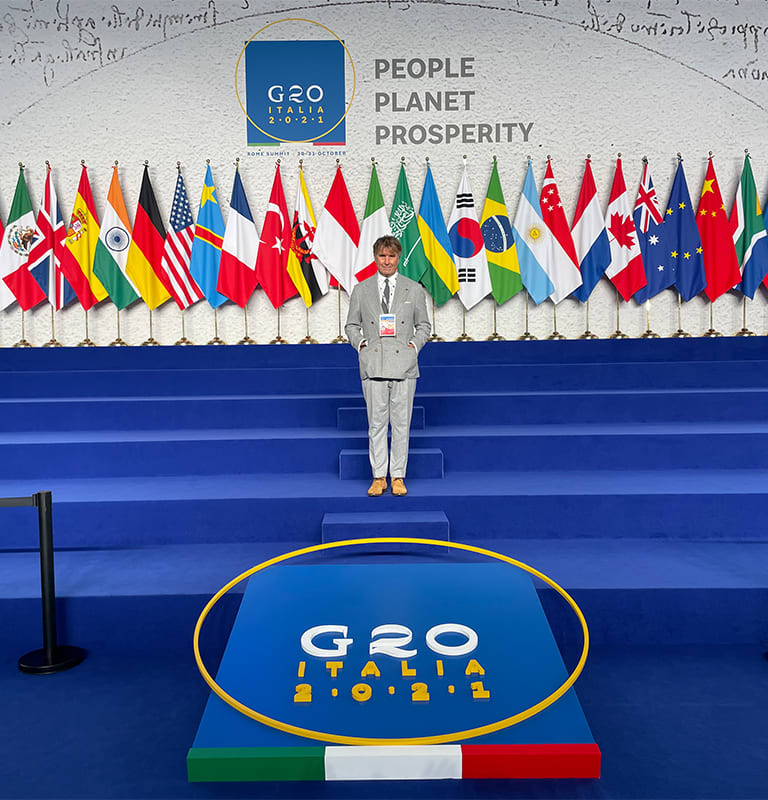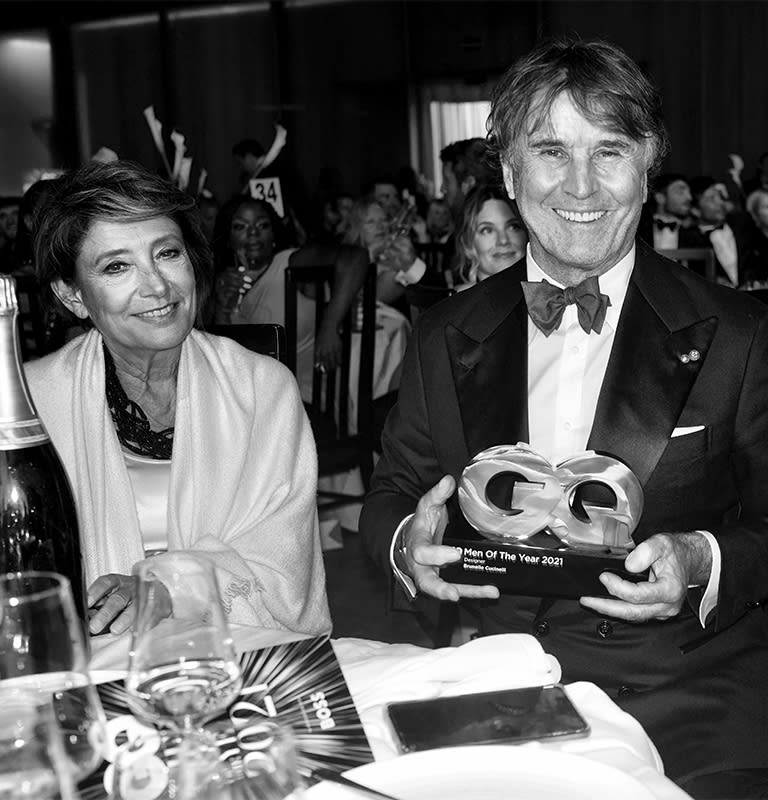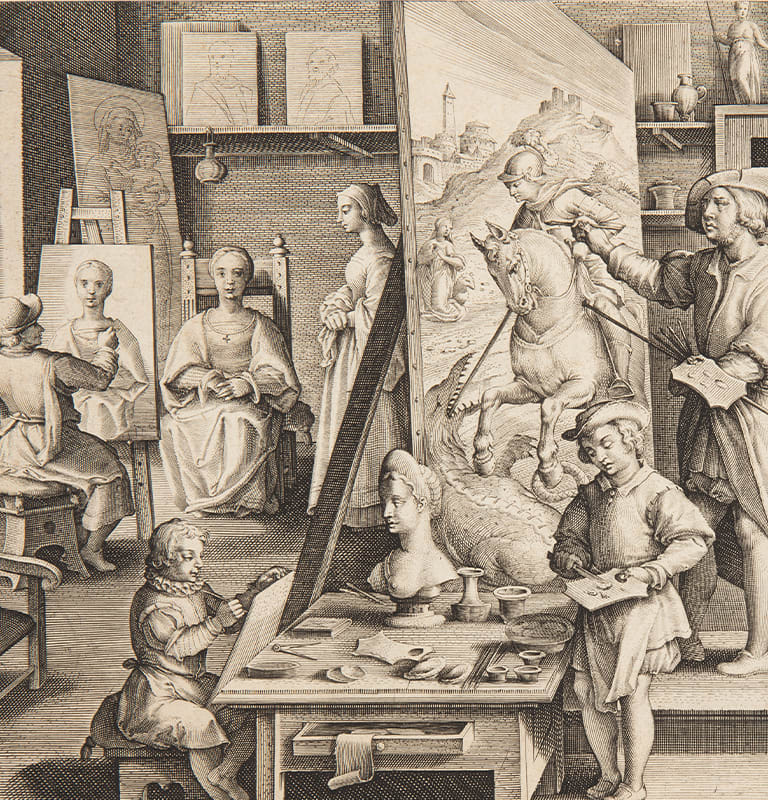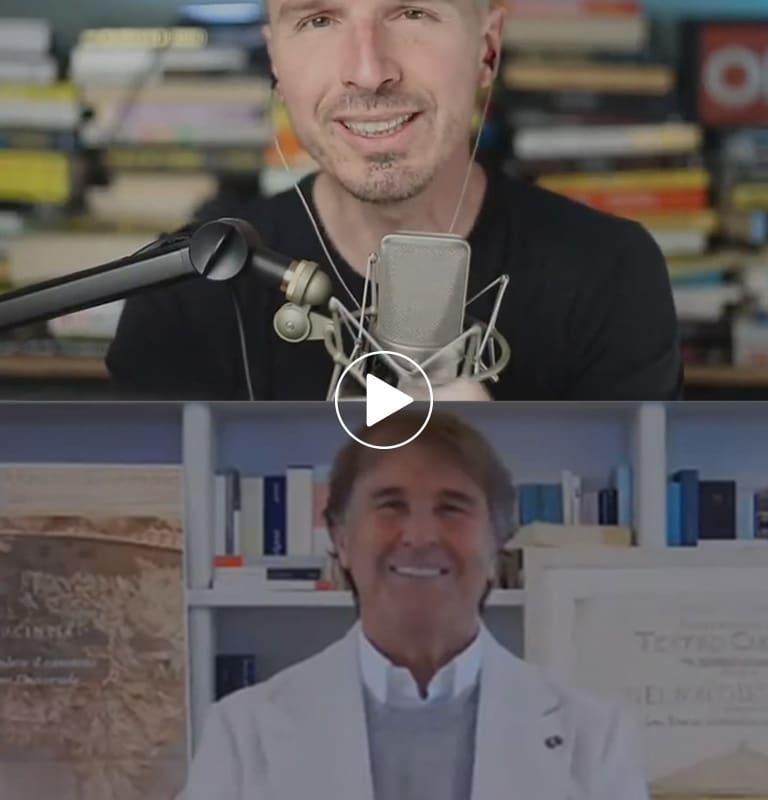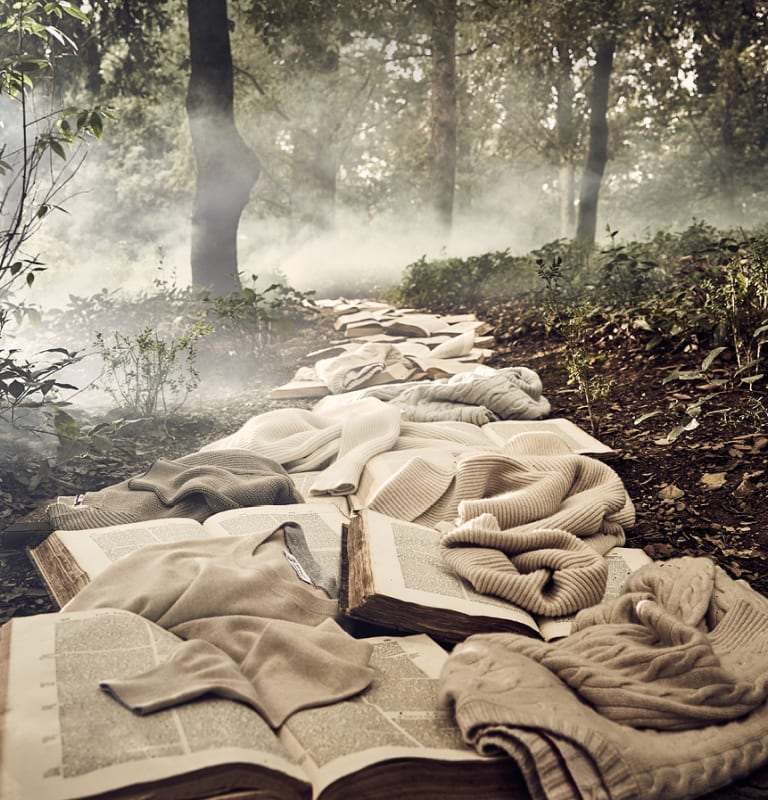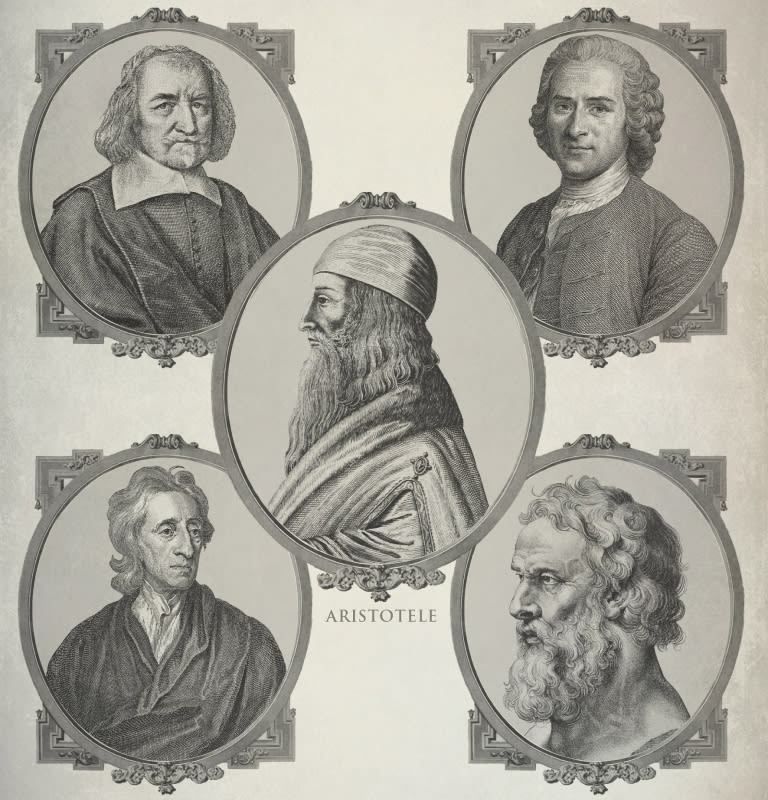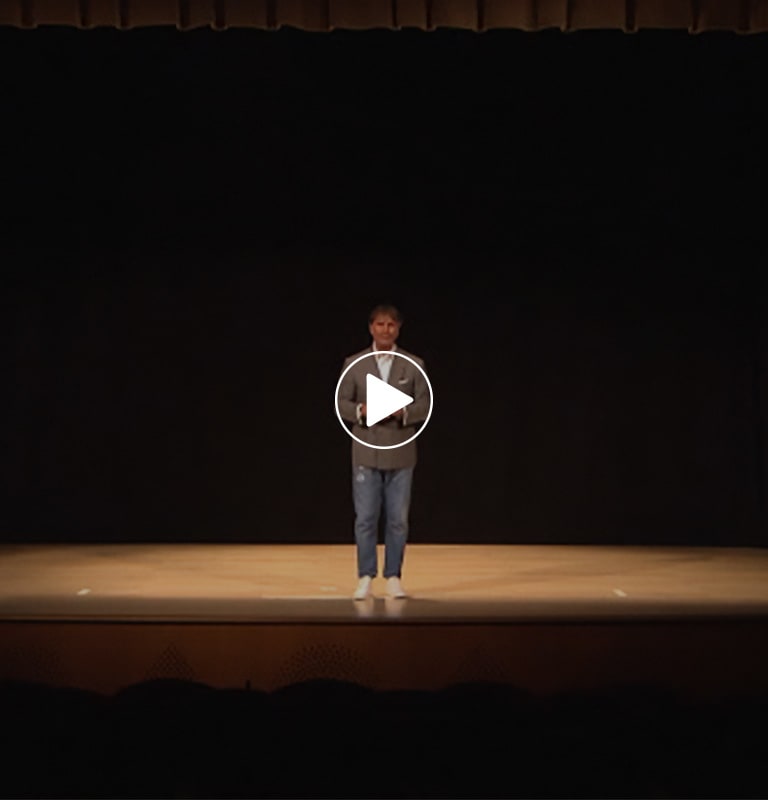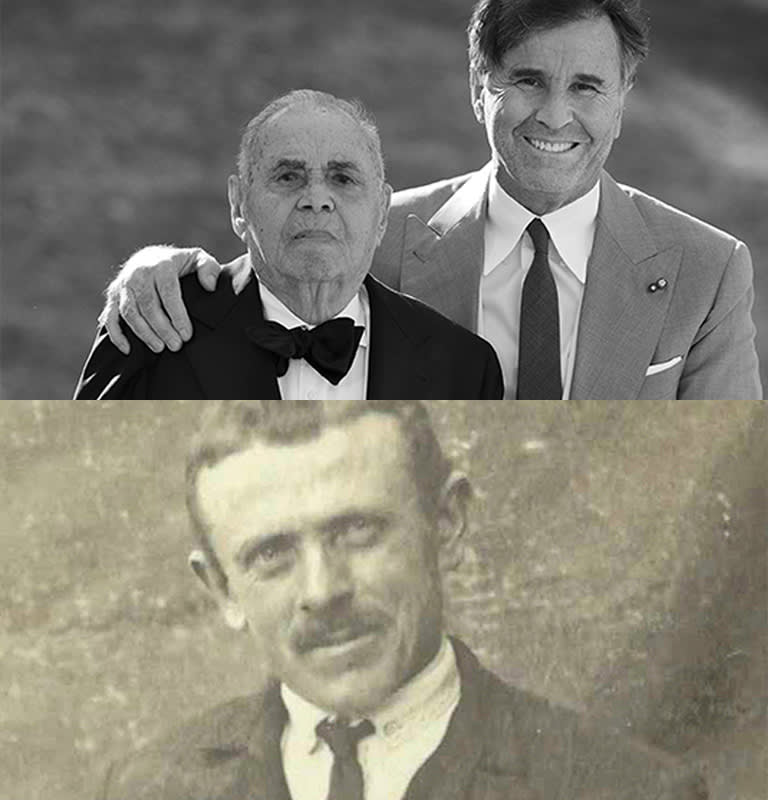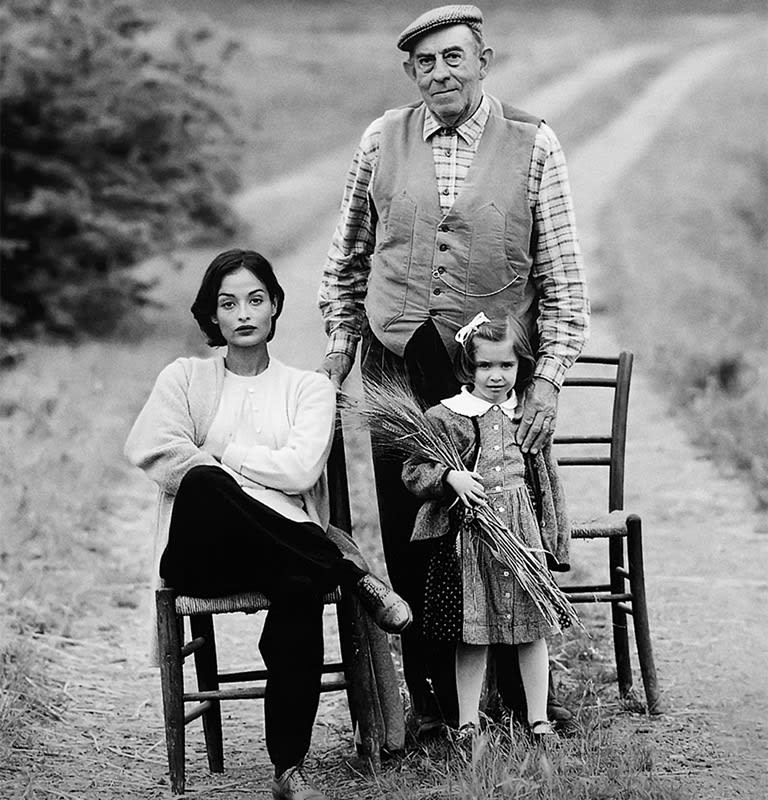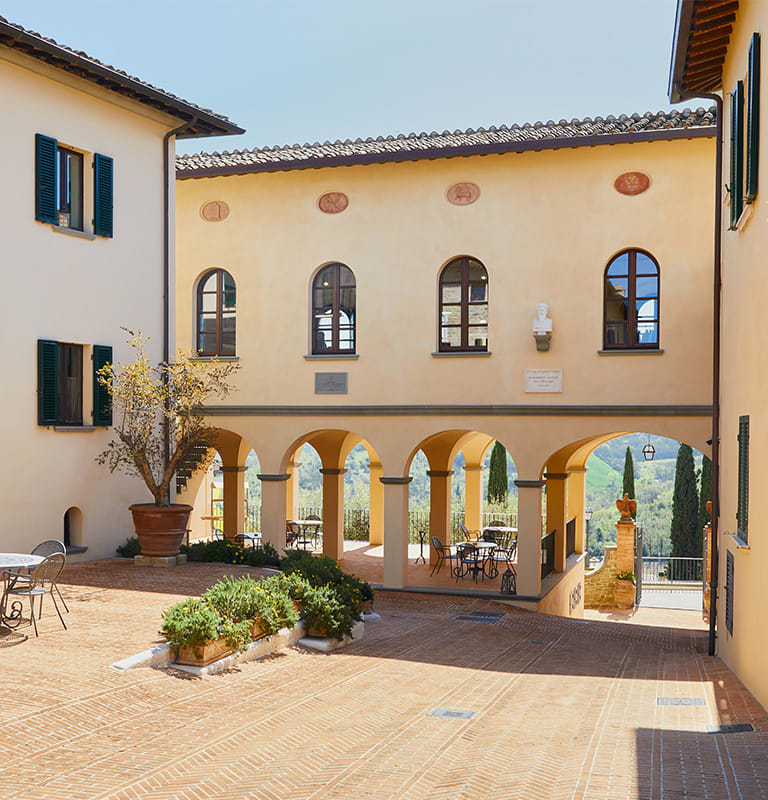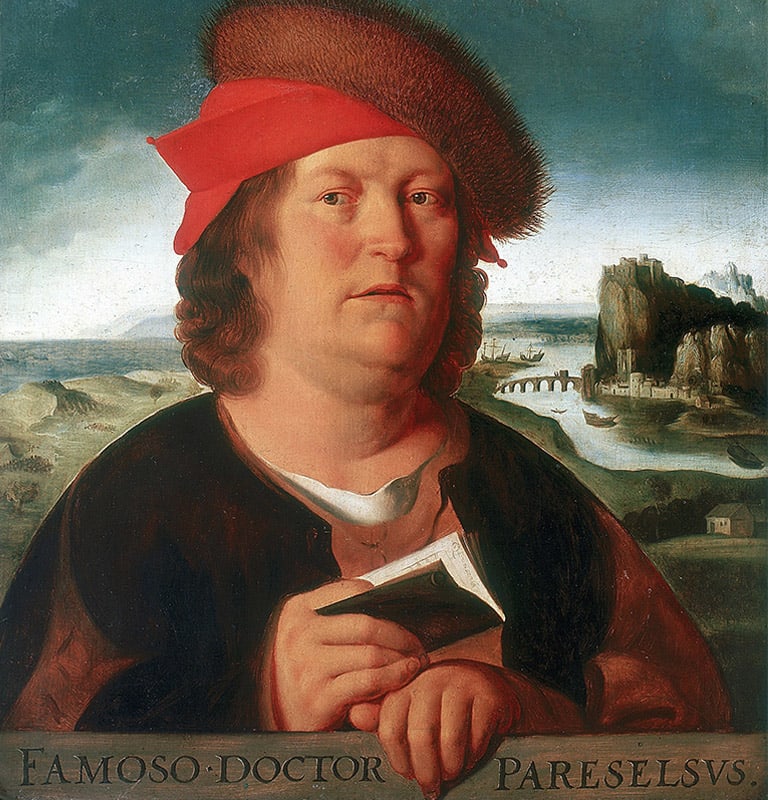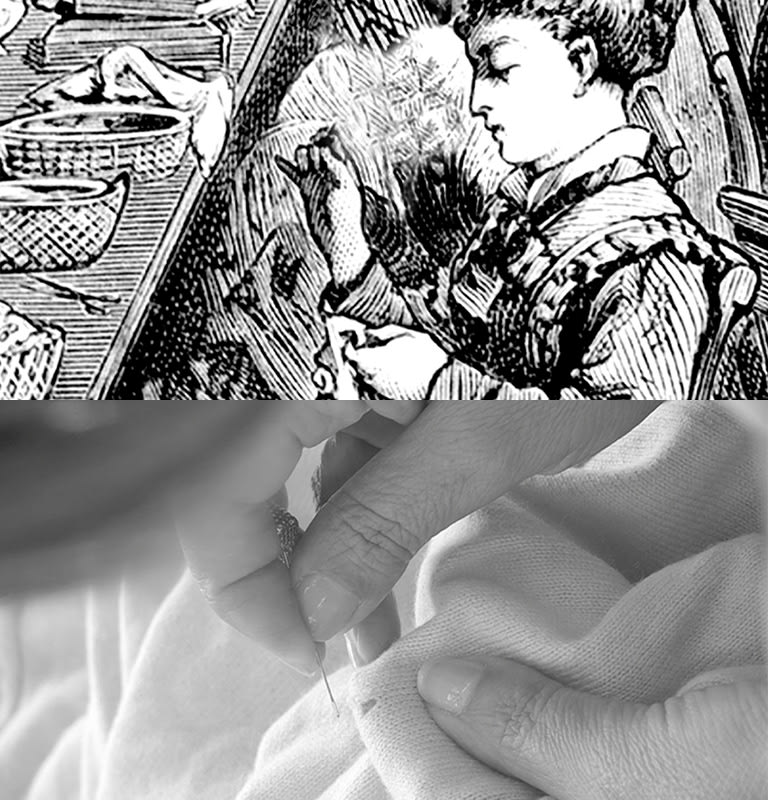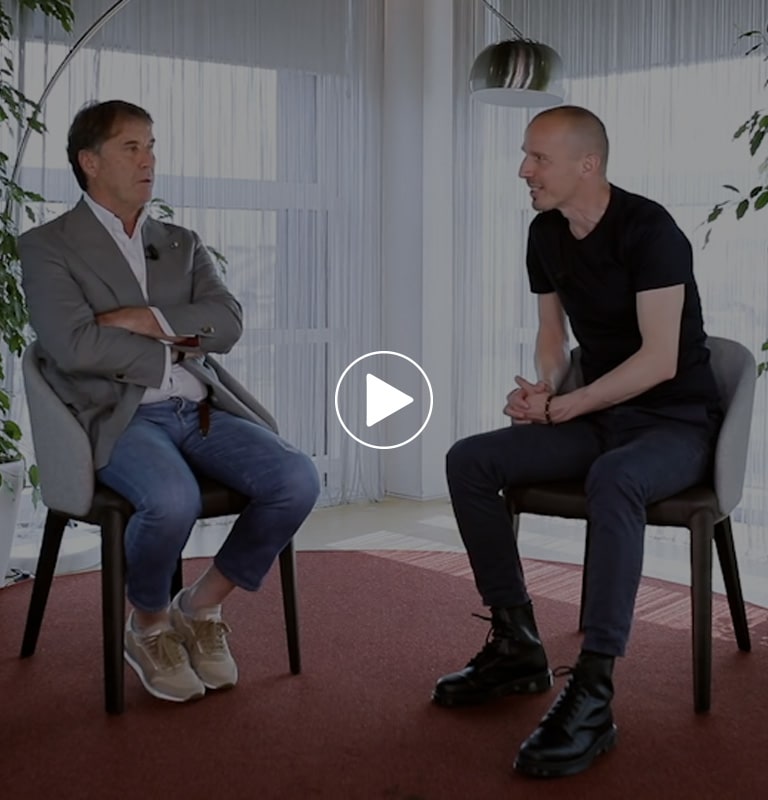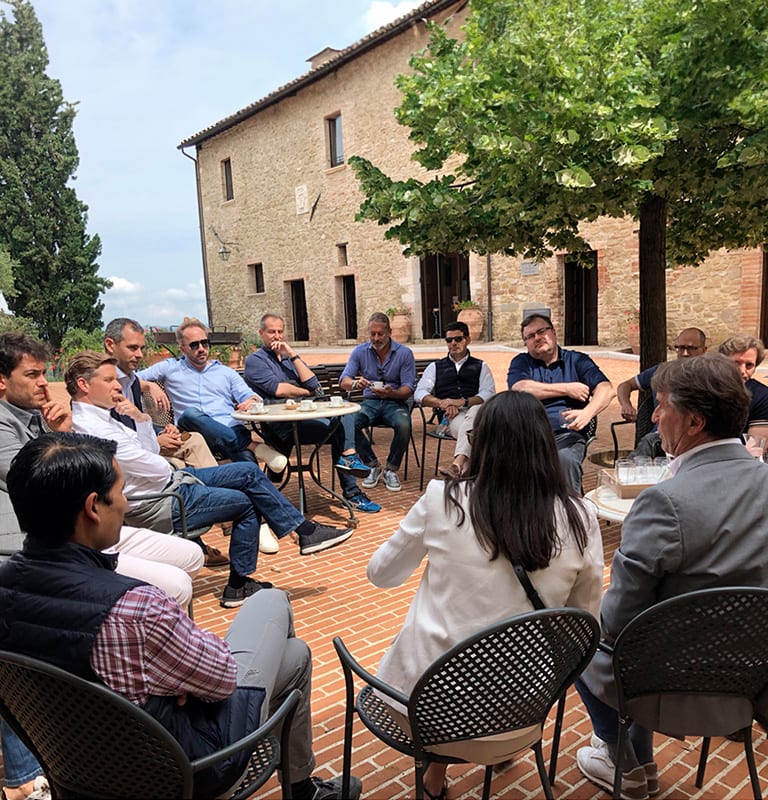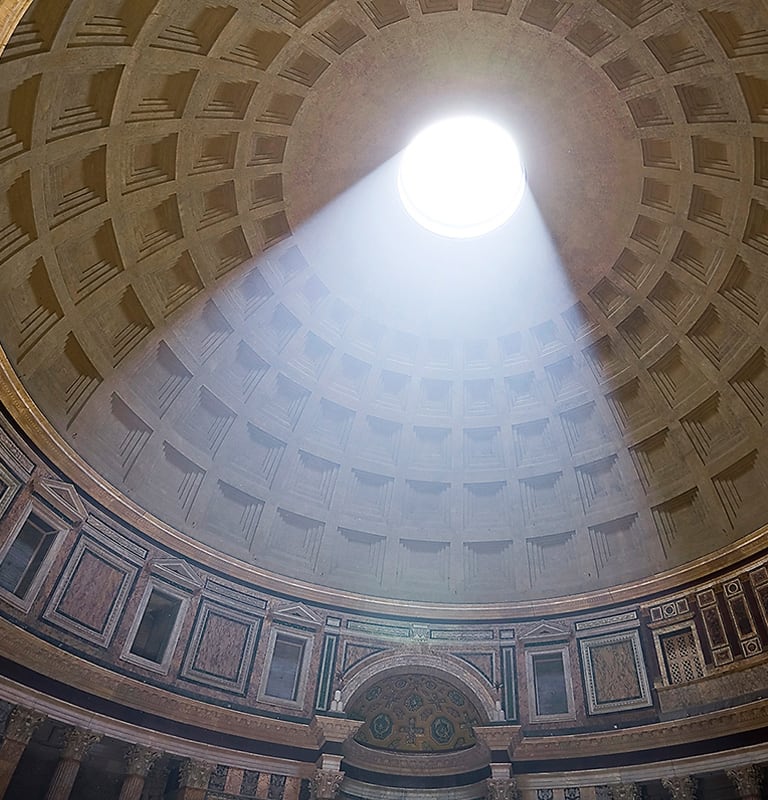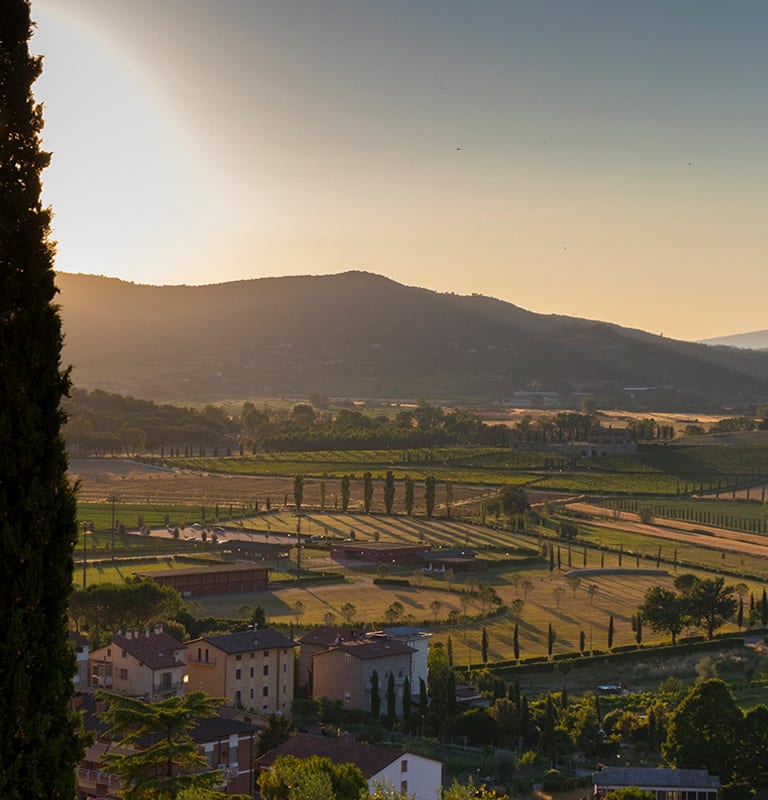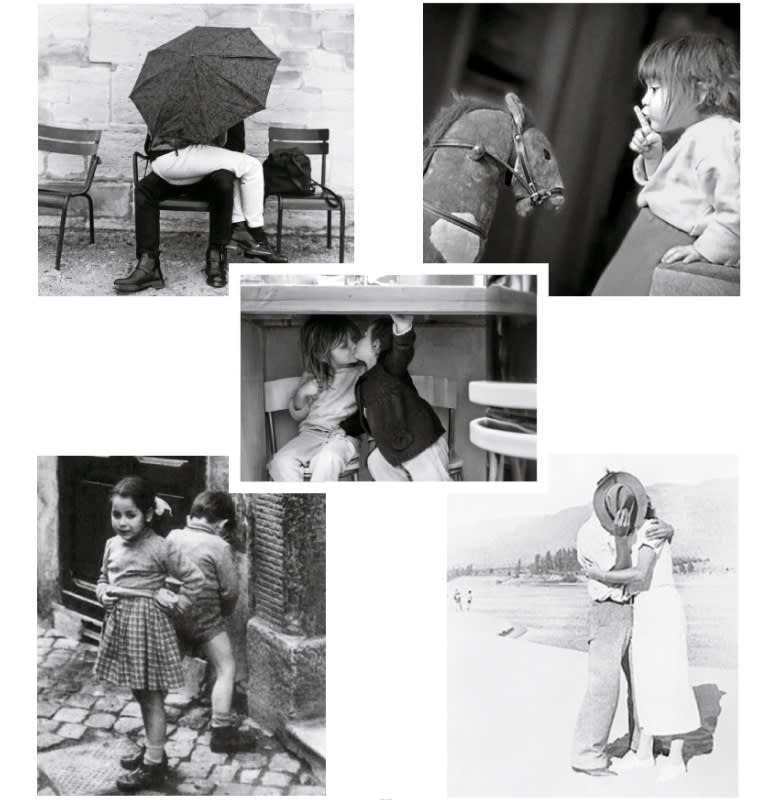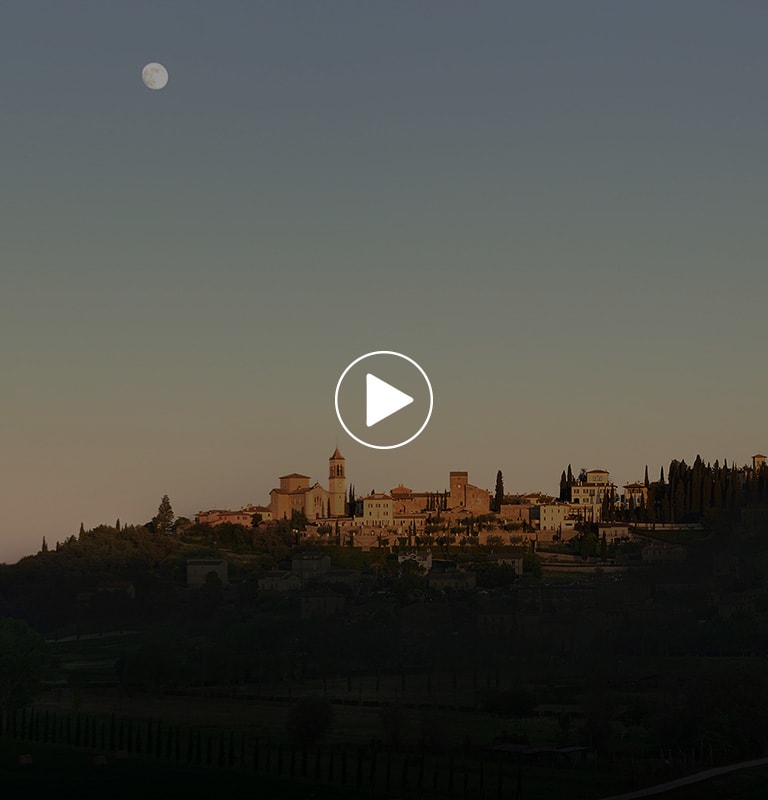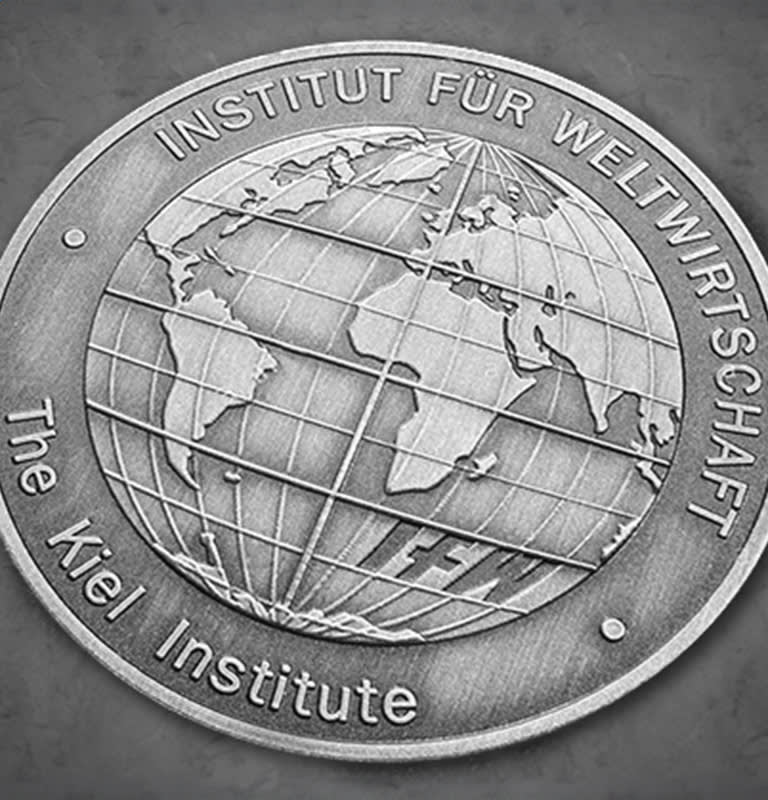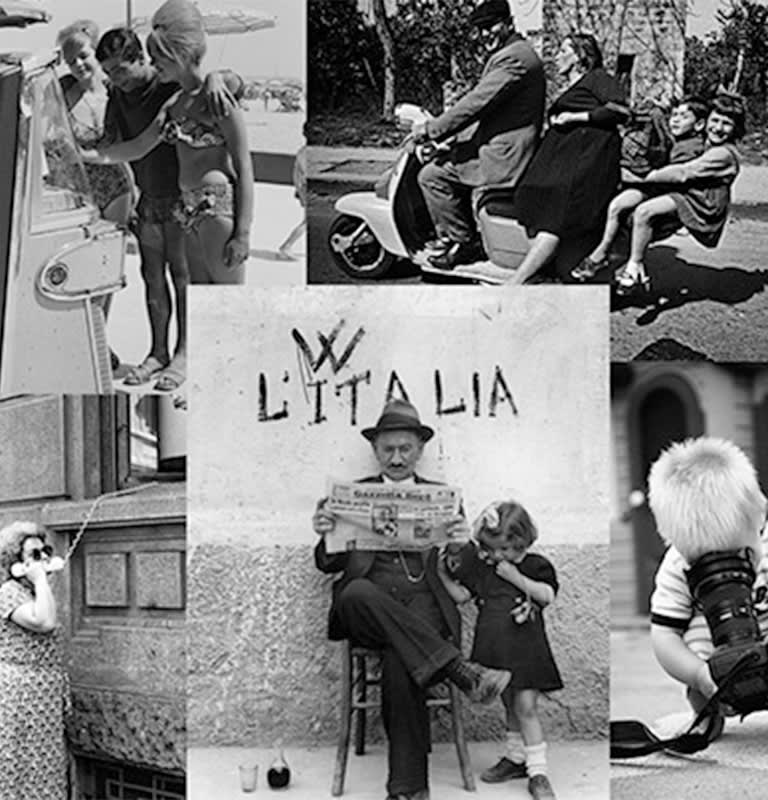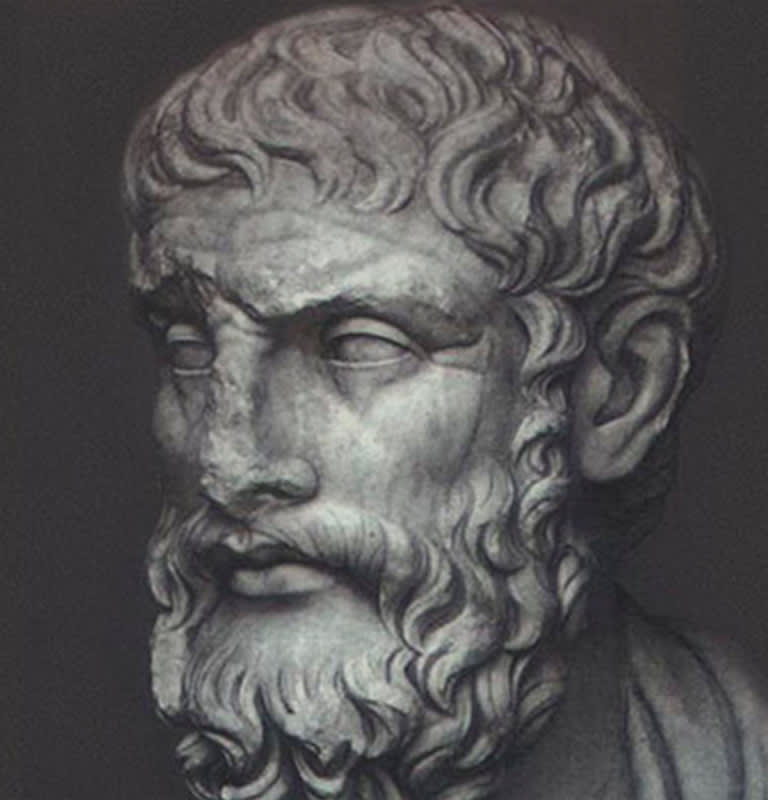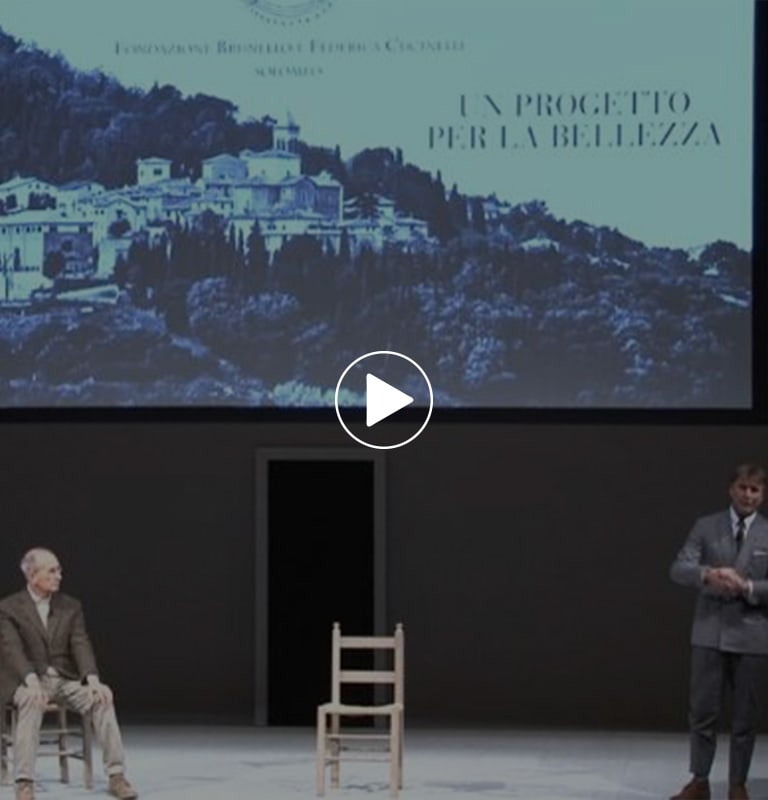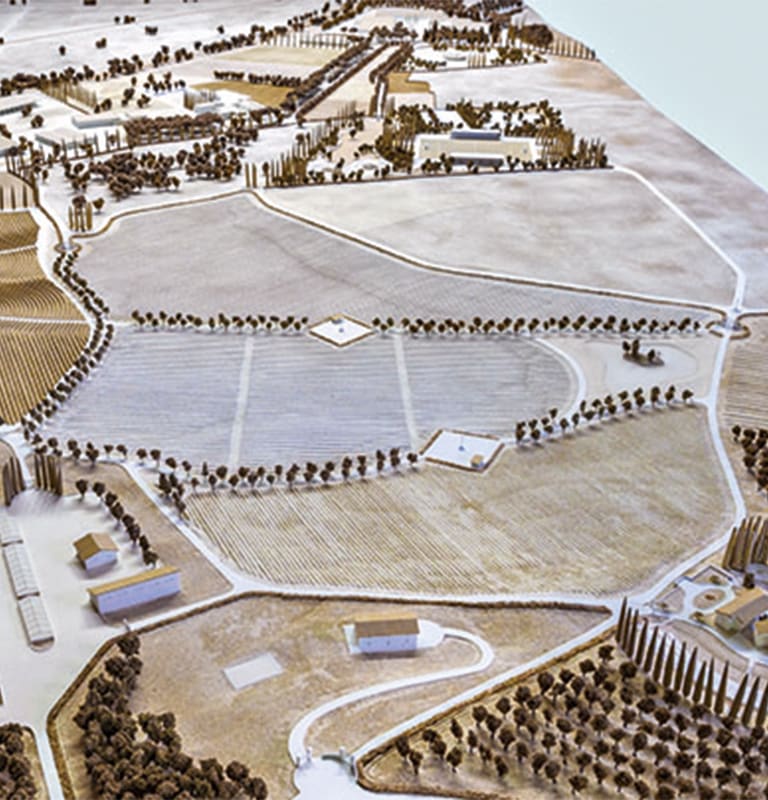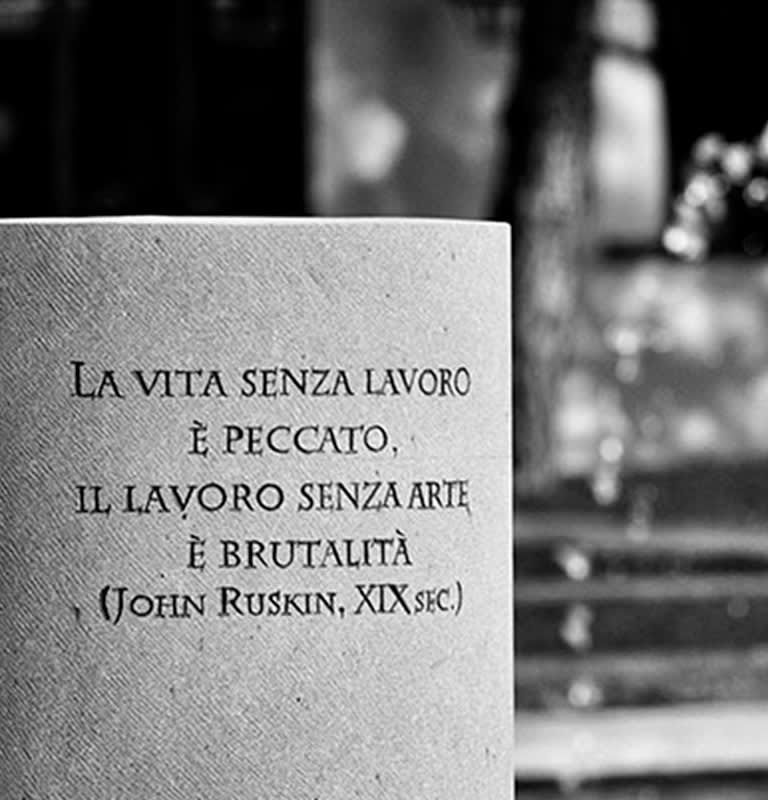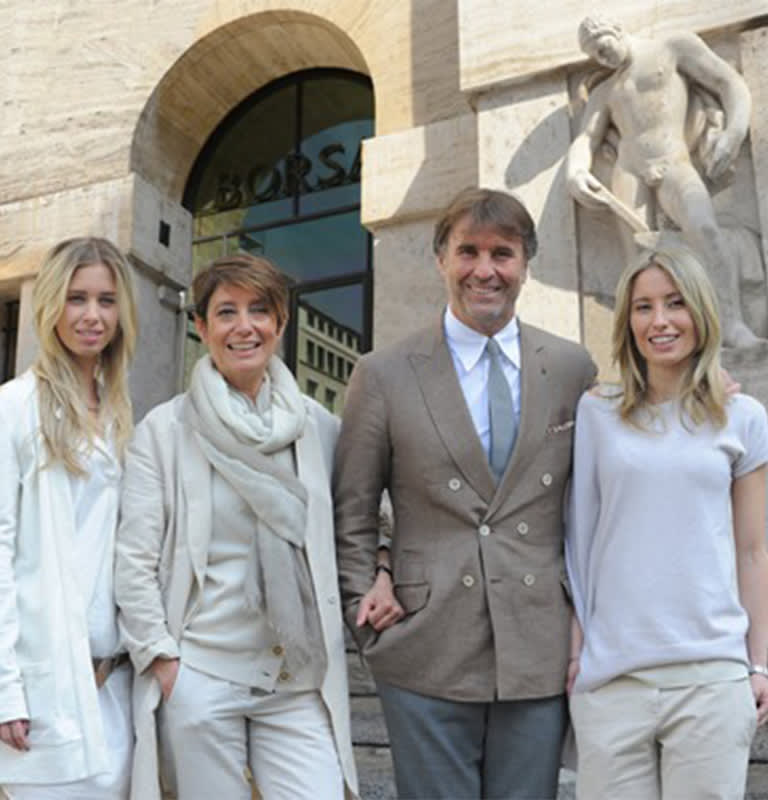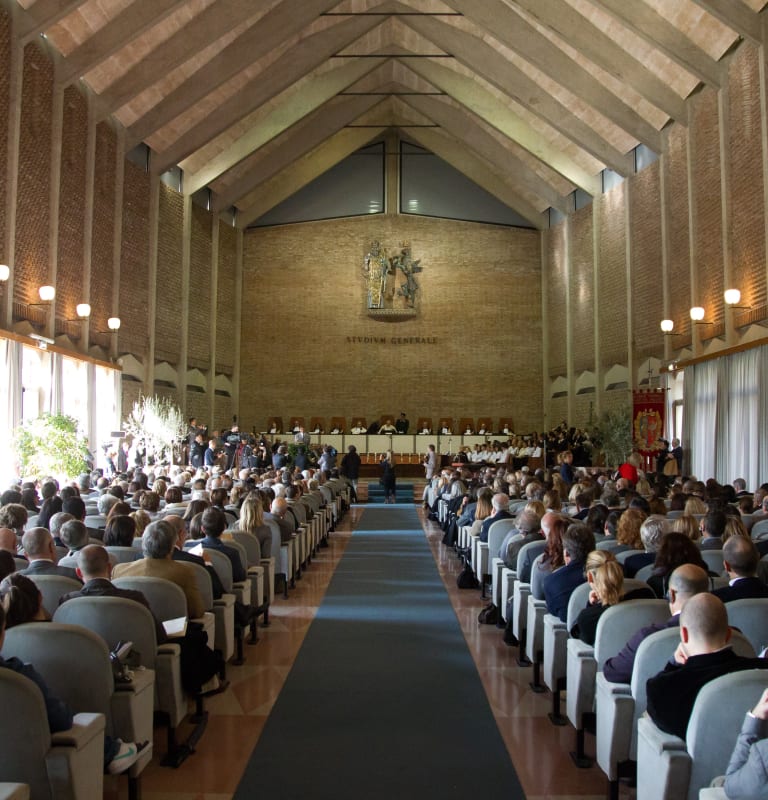label.skip.main.content
The Universal Library of Solomeo, a gift for the next thousand years
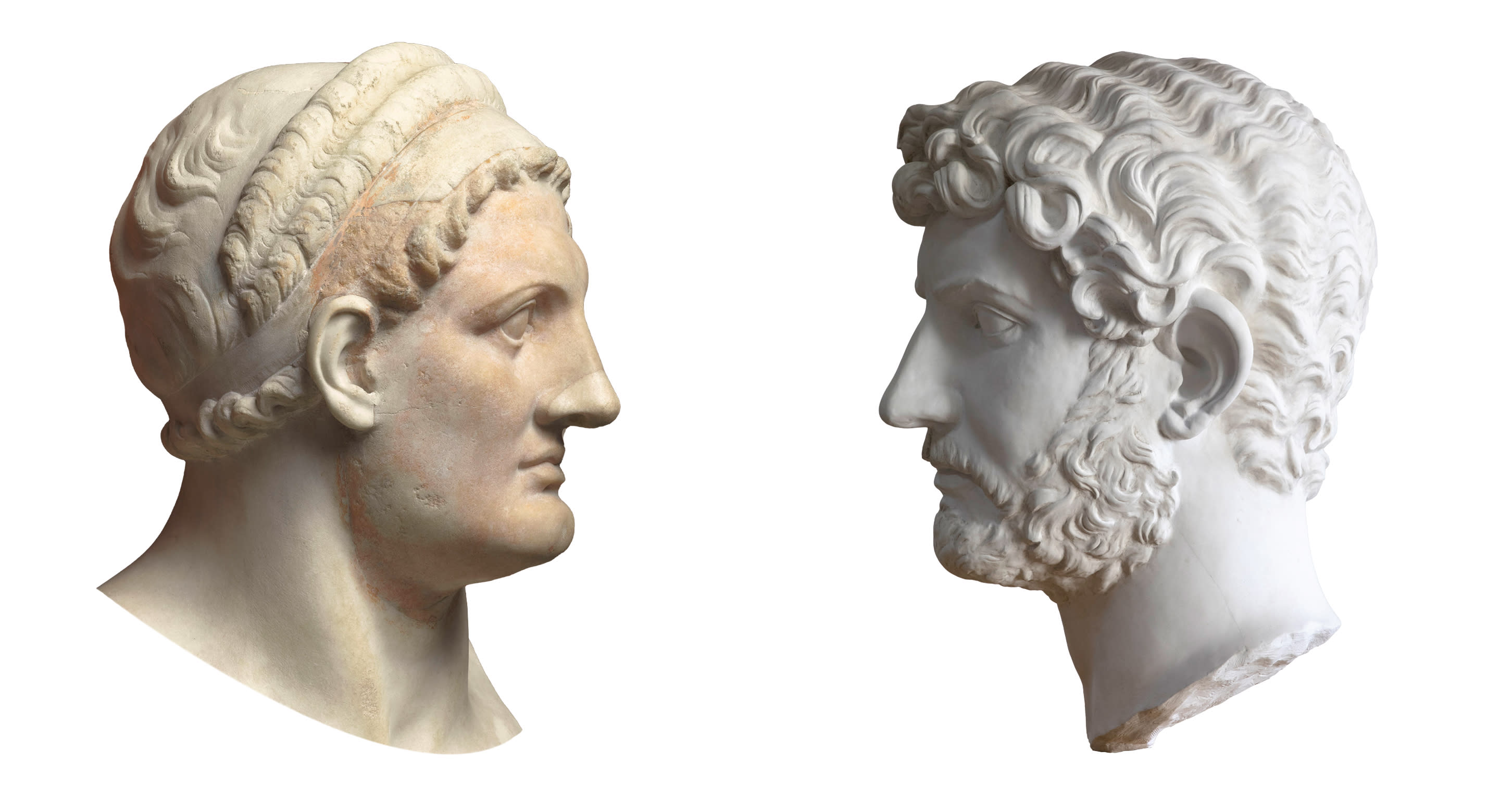
Left: Ptolemy I Soter (c.367 B.C. - 282 B.C.), marble bust © 2023, RMN-Grand Palais/Dist. Foto SCALA, Florence.
Right: Bust of Emperor Hadrian
«The founding of libraries is like constructing public granaries»
Emperor Hadrian
Solomeo, 28 October 2021
I was about fifteen years old when my family and I left the countryside for the city, following the dream of many farmers like us of a more secure and reliable life, but alas, more and more distant from nature, which had generated us and welcomed us maternally for so long with its sunrises, its sunsets, the scent and gold of wheat, the winter warmth of the animals. Now everything had changed, and most of the day was spent at Gigino's bar in Ferro di Cavallo, the neighbourhood of Perugia where, little by little, with our small savings, we had built the new house. And it was in that bar, which I still consider my university of the soul, that my first encounter with philosophy took place at the age of seventeen, with none other than Emanuele Kant, thanks to a book, the Critique of Pure Reason, which two high school students, among the most assiduous patrons of Bar Gigino and its colourful range of people, took with them to revise, and who knows how they managed in that confusion.
They spoke with passion of that subject which was almost unknown to me, and that book took on multiple symbols; I sensed in it the great world of thought, and it acquired an extraordinary value for me; in the following days I went around who knows how many bookshops and second-hand book stalls until I found a copy; in the evening, after dinner, when all was quiet, I tried to decipher those words, so difficult and so attractive, some of which, like the following ones, would later become my guide, as I have said and written several times:
ACT IN SUCH A WAY THAT YOU TREAT
HUMANITY,
WHETHER IN YOUR OWN PERSON
OR IN THE PERSON OF ANOTHER,
ALWAYS AS A NOBLE END
AND NEVER SIMPLY AS A MEANS
That first enchanting encounter was followed, years later, by another experience that would leave a mark on my life, and that was reading Margaret Yourcenar's book, Memoirs of Hadrian. It was about history, but above all it was about the soul and life. I was twenty-three years old, and it was then that I learned to consider the world in its vastness, to consider time in its duration, to meditate on the soul with serenity and tranquillity.
Several years later, when I was about twenty-five, my cousin Luisa, after the death of her father, gave me a copy of Plato's Phaedo that had belonged to him; in the simple gesture of giving me that book and in the spontaneous way in which I received it in my hands there was something that today seems almost sacred to my memory.
It was a well-kept book; it showed the thousands and thousands of times it had been leafed through, and the gentleness with which the pages had been turned so as not to ruin the binding; and how many sentences, how many words, underlined in red pencil; I am reminded of those old-fashioned double-ended pencils, blue on one side and red on the other, the ones teachers used to mark mistakes.
Those underlined parts seemed to speak to me of an age-old passion, of a man in whom – who knows where from – an almost necessary intention of knowledge was born, and I imagined those evenings in which, by the dim light of the lamps of those days, my uncle Orlando, despite being tired from work, stole precious hours from sleep to study with the little schooling he had, to question the great mind of Plato, this man, this philosopher who, according to the ancient Greeks, descended from Poseidon.
Perhaps that book acted like a catalyst, and indeed, perhaps such distant event kindled the desire, and then the interest, to have more books, to keep them, to read them and to love them. They most certainly had a powerful influence, and as the years went by I realised that my desire to know was always a few notches higher than the number of books I bought and the time it took to read them.
Perhaps all this was like a nuclear reaction, an inexhaustible engine behind the great choice for which we are here today, amiably gathered together. Certainly, a sort of veneration for books was born in me, for the thought and spirit that hovered over them, imprinted by the powerful minds of so many greats of the past whose shadows now spoke to me. There was such devotion on my part, I must confess, as if I were divinating the book, its physical matter on which history was permanently imprinted. Every true book, every important work, is still for me, as Ruskin said, a king's garden, in which the sovereign graciously welcomes us, letting us enjoy the beauty of its plants, the colour and scent of its flowers, the balm that exhales from them, but asks for the respect that all things in Creation deserve.
Today I am convinced that the universality instilled by the great thinkers in their writings is perhaps the greatest gift to humanity, and that this gift nourishes any collection of books, large or small, as long as they are good books; a library, therefore, which precisely for this reason feeds on this universality and identifies with it. And if every man has a special dream, for art, for technology, for history, or whatever, this universality seems to me to be a requirement inherent in the greatness of the author, perhaps even more so than in his works, however fascinating they may be.
And indeed one day, together with Massimo, whom I affectionately and jokingly view as my Aristotle, during one of our walks that have now become a well-established and ever new ritual, we were once again looking at the works that have been carried out over time in Solomeo with such passion: the Wood of Spirituality, the restoration of the Hamlet with the Castle and the Church, the construction of the Theatre, viewed by us as a secular temple of Art; the winery with the vineyard, a tribute to Mother Earth, as Xenophanes teaches us: "From the earth all things derive", the building of the Monument to the Dignity of Man. We thought that after all, Solomeo, with its works, suggests an elegy, a humanistic path that from spirituality – at the top – moves down to history, art and culture, and then to the work of man, artisan or farmer, and to the celebration of that entity that is the maker of all this according to the laws of Creation: the human being.
And we wondered, one day when we were particularly exhilarated: "How could we keep up this noble narrative, what would we like to give to the world for the next thousand years, feeling as we do like guardians of Creation"? I am an entrepreneur by trade, Massimo is an architect, and all these things represent for us the pleasure of trying our hand at something new and beautiful for mankind, like a series of gifts destined to remain in time. The idea of time took us back, to Emperor Hadrian, and even further, to Alexander the Great, men who both knew how to combine dreams with actions for the benefit of the world; we remembered that they both loved books; Hadrian thought that founding a library is like building a granary for the spirit, and one of Alexander's most trusted generals was Ptolemy, who wanted to build the most famous library in the world in the newly-founded city of Alexandria. And so we said to ourselves: why not follow on the dream of those great men in spite of our smallness, why not build a great library here in Solomeo, almost as a necessary and desired thing; a library that, thanks to the universal thinking of the authors of the books that will enrich it, may be imagined as "universal"?
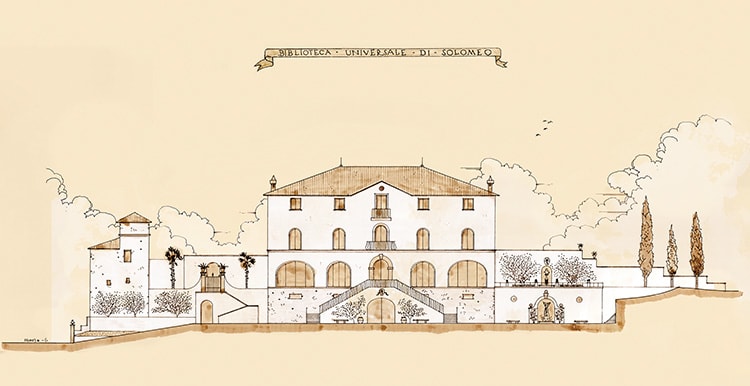
Front elevation of the Universal Library of Solomeo, drawing on paper.
We thought of the Ptolemies, of their gargantuan vision of creating a great repository of all the human knowledge known to their time, and thus making Alexandria the true cradle of the culture of all the Mediterranean countries. What a grand dream this is in our eyes! The Ptolemies did indeed build an exceptional cultural monument for the whole world. The result was a library that, with its 490,000 scrolls, became one of the seven wonders of the world! Ptolemy the First had the courageous genius to collect the texts of ancient Greece and in particular the work of Aristotle; he himself had been a student of Aristotle, with the other young men, raised together with Alexander, future generals and Diadochi, the spreaders of Hellenism, those young men chosen by Philip the Macedonian, whom he flanked to his son to be brought up in war and wisdom. But we were also thinking of the son of Ptolemy the First, who bore the same name as his father, and honoured him by pursuing that fascinating path, broadening it, sending envoys to every part of the world to collect all the books possible; and it is fascinating to think that he forced foreign ships in port to make copies of the books they had on board, and then returned the copies to them, retaining the originals! He had a catalogue drawn up by scribes and clerics, and we have imagined those ancient scholars bent over the scrolls, studying them, classifying them, in the sacred silence of an immense building, which was part of the museum of the great royal palace. And we were reminded of the words carved on the entrance to the Sacred Library of the funerary complex of Pharaoh Ramses II, quoted by Diodorus Siculus: "Apothecary of the soul".
The first person in charge-guardian of the Library was the philologist Zenodotus of Ephesus, followed by the famous poet Callimachus... How exciting to imagine Alexandria, which for many centuries would remain the centre of the world for human wisdom! I do not like to think of its destruction, which finally came with the Romans, because I think rather of the eternity of its historical substance, that which remains in the heart of every seeker of knowledge. The idea of that immense granary of the spirit - this is how Hadrian the Emperor, as I have already mentioned, viewed libraries - still appears to me today in all its brilliance; for this reason it gives me strength, and here is the new dream, the new Library of Solomeo, which, as already mentioned, I would immensely like to be able to call "Universal". And where to build this new project, which special place to choose for a project that seems so rich in value to Massimo and me?
Here in Solomeo, with the castle, the church, the theatre, the amphitheatre and the garden of the Gymnasium, there is some sort of secular Acropolis, which we like to think of as a place that belongs to all those who love fine things, the arts and culture. And right behind the theatre is a splendid 18th-century villa, which the very elderly owner has decided to sell. It is a villa and garden complex with a large park that descends towards the valley and, coming to Solomeo from Perugia, with its cypresses and holm oaks, it forms an immense base of greenery. So I like to think of this villa as the noble seat of the "Universal Library of Solomeo", where I would like to begin to preserve, year after year, the ancient wisdom of so many parts of the world; where anyone, if they wish, can come in to study, to read a book, but also to have a walk in the park; the latter would become the public park of Solomeo, and my architect friend and I view it as some sort of Villa Adriana in Tivoli, perhaps with the addition of some corners reminding me of the beautiful places that have fascinated me during my travels in Greece; and I would also like to plant a vegetable garden, as a tribute to Cicero, who stated that " If you have a library and a vegetable garden nearby, you have everything you need". I envisage Solomeo itself, the Hamlet of Cashmere and Harmony, as an uninterrupted and amiable sequence of parks, fine buildings, streets full of flowers: after all, as I have imagined for many years, Solomeo is a widespread garden. A bit like what Strabo said of the Library of Alexandria, made up of various halls for the periodic symposium of scholars, as well as for other important meetings, such as assemblies-debates or celebratory speeches, or even for convivial moments. This is the image I have of the new project, which to me seems visionary.
And I would like books to be taken directly from the shelves, breathing in the scent of wood and paper, with green-light lamps, and to be read at the table, but also on comfortable armchairs, next to a window through which, turning your gaze, you can admire the enchanting Umbrian landscape. The shelves will be almost empty at the beginning, because a library is like a desire suspended between past and future, destined to grow like a living organism, just as the books themselves seem alive to me, in their physicality, and I would like them to be read here only, on paper, and not on computer screens. And I would be very happy if my children's children, over time, loved this project and preserved it for centuries.
I have always been fascinated by Philosophy, Architecture, Literature; a group of experts will be entrusted with the task of selecting the most classic works from all over the world related to these disciplines, a non-exclusive choice, simply because humanity has no boundaries. I am reminded of a beautiful thought by Voltaire: "I keep to old books, for they teach me something; from the new I learn very little". And how can we forget that according to Montesquieu: "Until we have read all the old books, there is no reason to prefer the modern ones"?
Also, I was struck by a memory of Massimo, who spoke to me of Manzoni's Don Ferrante, an amiable individual who loved books not as a scholarly luxury, but as an intimate pleasure of the soul.
However, it is nice to live in my own time and to know how the thought of the ancients is interpreted with the experience and wisdom of today. This is why the type of book I would like to see on the shelves of the Universal Library of Solomeo is the original text but in current editions, enriched by fascinating, simple and deep prefaces, to be read after finishing the book, and not before.
In the wisdom of man I see his spirituality, and this spirituality, it seems to me, has a universal nature. Today we need, I believe, to rediscover true spiritual values, those ideals that are permanent because they are human, and I am convinced that books are one of the best ways to achieve this end. But after all, thinking of the next three hundred, five hundred, a thousand years, the purpose that drives me to the great new commitment of the Universal Library of Solomeo is also the desire to give to future generations a place where the past calls attention to the future, to a bright tomorrow that awaits us; it is also a gift to past generations, because I think that if books are spiritual nourishment for young people, they are also the delight of old age. I have a vision of a Forum of the Arts where the Theatre, the Amphitheatre, the new Universal Library with its park open to the public, all represent a widespread, open and appealing place, an ideal meeting place, like in the ancient parks of the philosophers, or like in the Library of Alexandria itself, where people taught, read, discussed, worked, and in their leisure time they gathered together in pleasant symposia, outdoors or indoors, depending on the season.
And allow me one more final quotation, which expresses the spirit that is perhaps closest to my idea of the Library, in the words of Petrarch: "I question the books and they answer me. And they speak, and sing to me. Some bring me smiles and consolation, others teach me about myself ".

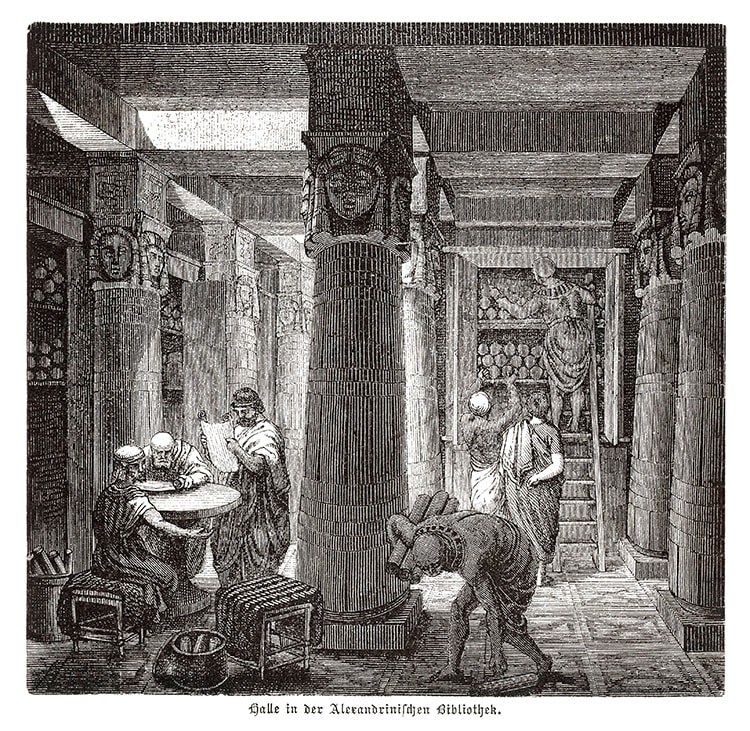
Scholars examine the scrolls of the Library of Alexandria © 2021.
Mary Evans/Scala, Florence
The Library of Alexandria
Reflections and historical notes
The Great Library of the city of Alexandria, the best known and most important library in the ancient world, one of the most outstanding works of mankind of all time, was founded in the 3rd century BC at the behest of the first king of Egypt, Ptolemy I (367-282 BC).
The idea of such a cultural endeavour was handed down from Aristotle to Alexander, and from him to Ptolemy.
Alexander the Great had learned from Aristotle ethics and political science, but also a love of knowledge in general and philosophical research in particular. Aristotle himself was probably the first ancient Greek philosopher to set up a systematic library in his Lyceum, conceived as a fundamental working tool to specifically focus on experimental sciences, a subject he himself had established. Indeed, Aristotle's complete works were the first books in Alexandria's library collection.
The work of collecting, preserving and archiving the materials - mainly papyri and parchments – was carried out by scribes, but also entrusted to the care and custody of priests, who were well educated and had the appropriate skills for such a philological work.
The project of the Great Library was then perfected by Ptolemy I's son, Ptolemy II (282-246 BC), who contributed most to the expansion and enrichment of the book archive.
No remains or finds have survived from this splendid cathedral of ancient culture, but the Library of Alexandria is an eternal symbol of the dream and encyclopaedic endeavour to bring together in one place all the universal knowledge of the then known world.
The city was founded by Alexander the Great himself in 331 BC.
However, it was during the Ptolemaic era that Alexandria became the most important commercial centre in the entire Mediterranean area.
With its strategic position on the sea, the city expanded greatly in a relatively short time and was significantly embellished under the rulers that followed.
If on the one hand Ptolemy I wished to preserve all the knowledge of the then known cultures for the benefit of the users of the Library of Alexandria, so as to bestow education and "wisdom" on as many people as possible, on the other hand his noble idea was also to pass on this huge number of texts to future generations.
The result was one of the Seven Wonders of the Ancient World, containing some 490,000 papyrus scrolls, plus some 42,800 in the adjoining Library of the Serapeum, the temple dedicated to the god Serapis.
Here, as the historian Strabo tells us, the volumes were kept in closed rooms in the temple's colonnaded courtyard.
The great Library stood inside the royal palace, in the so-called Museum dedicated to music, an imposing centre of Greek culture for academic studies, astronomy, mechanics and medicine, out of which the famous 'Alexandrian School' was born.
Construction work on the building began around 290 BC under the supervision of the philosopher Demetrius Phalerus, who had trained at the Aristotelian Lyceum as a direct student of Theophrastus, Aristotle's successor.
The first Greek version of the Hebrew Scriptures, i.e. what is known as the 'Bible of the Seventy', was drafted in the Library of Alexandria.
Ptolemy II went so far as to urge all the kings of the known world to send to Alexandria any work in their possession on any subject, thus contributing to the beauty, variety and greatness of the Universal Library.
The Universal Library of Alexandria had illustrious directors, including Eratosthenes, Aristophanes and Aristarchus of Samothrace, and Alexandria itself became a coveted destination for all the writers, poets and scientists of the time; the primacy of its enormous Library remained unrivalled throughout the Hellenistic period. Among the most illustrious names of wise men who fell in love with Alexandria, we should mention first and foremost Euclid, the great mathematician who contributed greatly to the spread of Pythagorean ideas.
It is highly probable that his students included Archimedes from Syracuse, who worked at the court of Hieron II and was to become Euclid's successor.
Over time, the Library of Alexandria suffered several fires. The first was in 48 BC, under Julius Caesar.
Octavian Augustus, as Hadrian and Antoninus would later do, took great care of the city and the library; starting with Caracalla, the real decadence of the Egyptian capital began, then worsened considerably under Aurelian and even more under Diocletian. Under Trajan, a series of destructions quickly erased centuries of magnificence and the historical monumental heritage of Alexandria.
The various fires and destructions were always followed by the same number of reconstructions, until the most serious and final blow at the hands of the Turks in 641 AD.
However, despite so many disasters, the great universal Library of Alexandria was not destroyed in a single, violent act at the behest of a single leader, whether Roman, Christian or Muslim. It probably simply followed the decline of the Ptolemaic dynasty and was thus progressively destroyed by neglect, having lost that precious, tenacious and noble work of care that had contributed to making it one of the Seven Wonders of the Ancient World.
An old quotation by the Greek bishop and writer Epiphanius, who lived in the 4th century AD, sums up the history of the Library of Alexandria with particular charm:
"After Ptolemy I came Ptolemy II, King of Alexandria, called Philadelphus, a man who loved beauty and letters. He founded a library in Alexander's own city in the so-called Bruchion (this is an area of the city now abandoned), and entrusted it to a Demetrius Phalereus with the order to collect the books that were to be found in all parts of the world. He wrote letters and put pressure on all the kings and rulers of the earth not to hesitate to send him the books they had in their kingdom and dominion: I mean the books of the poets and the logographers, the rhetoricians and the sophists, the physicians and the masters of medicine, the historians and many others. When the work had progressed and the books had been collected from everywhere, one day the king asked the person in charge of the library how many books had already been collected. He replied to the king: 'There are more or less 54,800 books. But we know that there are still many others in the world, among the Ethiopians and the Indians, the Persians, the Elamites and the Babylonians, the Assyrians and the Chaldeans, the Romans and the Phoenicians, the Syrians and the Romans living in Greece (who were not yet called Romans but Latins). But also in Jerusalem and Judea there are the sacred scriptures of the prophets, which speak of God and the creation of the cosmos, and of every other teaching of common use. If therefore, O sovereign, it seems advisable to your majesty to collect these books too, write to the teachers in Jerusalem and they will send them to you, so that your excellency may add these volumes too to the library".
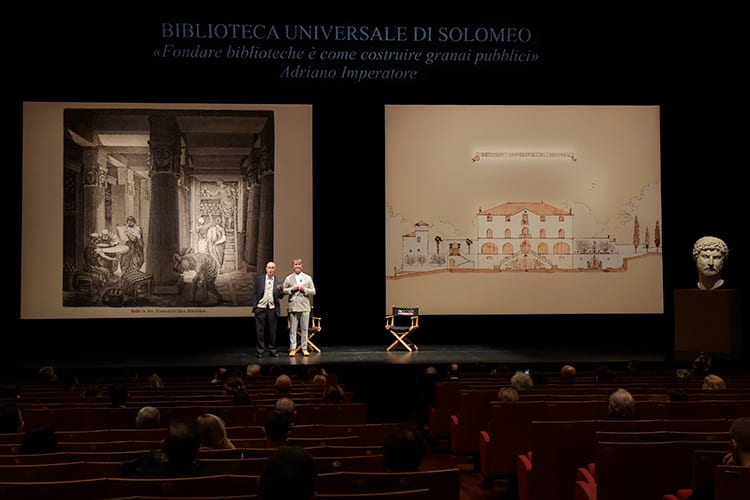
Brunello Cucinelli and Massimo de Vico Fallani


